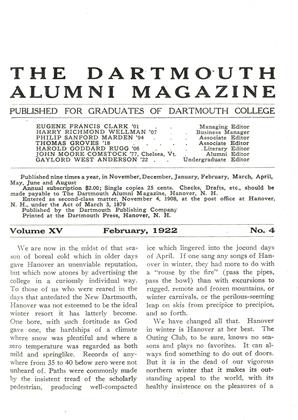December 19, 1921,
Editor Alumni Magazine:
Dear Sir:—While I have great respect for Mr. Andrew W. Edson of the class of '78, I wish to express as Chairman of the Alumni Fund Committee the dissent of the Committee to the scheme of life insurance suggested by Mr. Edson in the November number of the Alumni Magazine as a substitute for the present method of alumni contributions to the College.
Mr. Edson speaks of the difficulty class agents have of inducing the Alumni to contribute to the Alumni Fund. The present Alumni Fund plan is comparatively new and there is no doubt but that it has been difficult to get it going. Each year the difficulties are less and the response from the Alumni is more generous and widespread as the following figures for the last six years will show :
Number of Amount Contributors Contributed 1915-1916........ 726 $12,177.40 1916-1917........ 1,066 20,675.77 1917-1918........ 2,729 64,566.72 1918-1919........ 2,282 62,080.53 1919-1920........ 2,803 58,005.67 1920-1921........ 3,292 70,455.70
As far as I know, last year's record of 57% of the alumni as contributors to the Alumni Fund is not surpassed nor equalled by the Alumni of any educational institution in the. country having an annual fund. In Mr. sons class over 73% were enrolled as contributors, for which Mr. Edson, as the class agent is entitled to great credit.
Mr; Edson says the plan of life insurance at the time of graduation for the benefit of the college has been tried and for some reason popped. There are several reasons for this, th £ ma™ reason is that experience has shown a only a small proportion of the policies are kept alive. When one stops to consider, it is apparent that the impersonal appeal of a bill for a life insurance premium is much more apt to be neglected than the appeals, sometimes necessarily reiterated, of an effective class agent. What virtue resides in life insurance premiums which would require less effort and organization to induce their annual payments as compared with annual payments to the college?
Even if, contrary to experience, policies were kept up, yet with the same expenditure by the alumnus, the benefit to the college is less. The premium on a $500 twenty year endowment policy taken out at graduation is about $22 annually. As a matter of simple mathematics the present value of $22 each year to the college or to any one else is greater than a $500 payment at the end of twenty years. If this were not so then life insurance companies would have very hard sledding. The same reasoning applies to other forms of insurance though the figures, of course, are different. What reason is there for not paying the amount of the premium, whatever it might be, direct to the college ?
If these objections to the life insurance plan did not exist there would always exist the vital objection that for about the first twenty years of the plan the college would be deprived of the support of annual alumni contributions, on which it now depends, from the classes adopting the plan. Not only as a matter of mathematics, but even more from the point of view of practical necessity, the college now needs the annual financial support of these alumni. A more or less illusory expectation of getting substantial financial aid from these alumni twenty years from now would be a mighty poor exchange. Nor should we overlook the intangible benefit to both college and alumni which results from the yearly contacts between the college and the alumni created by the alumni fund.
Last year's senior class, after, having all the facts relating to the insurance plan presented to it, decisively voted the plan' down. The alumni fund committee hopes that it will not again be revived.
Chairman, Dartmouth Alumni Fund Committee
 View Full Issue
View Full Issue
More From This Issue
-
 Article
ArticleWe are now in the midst of that season
February 1922 -
 Article
ArticleOUTING CLUB CABINS AND TRAILS
February 1922 By I EUGENE FRANCIS CLARK '01 -
 Article
ArticleTHE DARTMOUTH OF THE FUTURE?
February 1922 By HARRY R. WELLMAN '07 -
 Article
ArticleTHE PLACE OF MENTAL HYGIENE AT DARTMOUTH
February 1922 By ARTHUR H. RUGGLES, M. D. '02 -
 Sports
SportsBASKETBALL
February 1922 -
 Books
BooksALUMNI PUBLICATIONS
February 1922 By L.S H.








